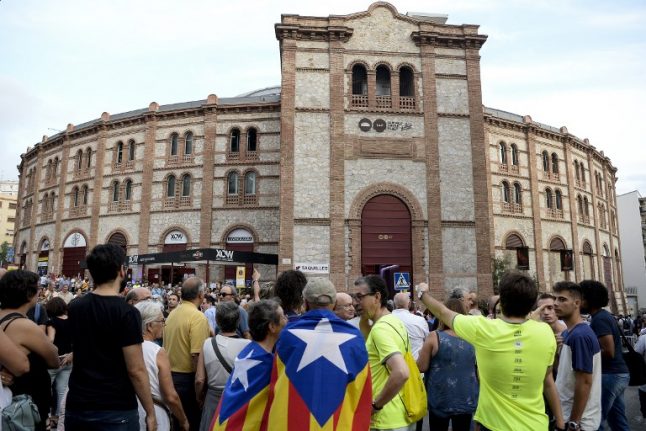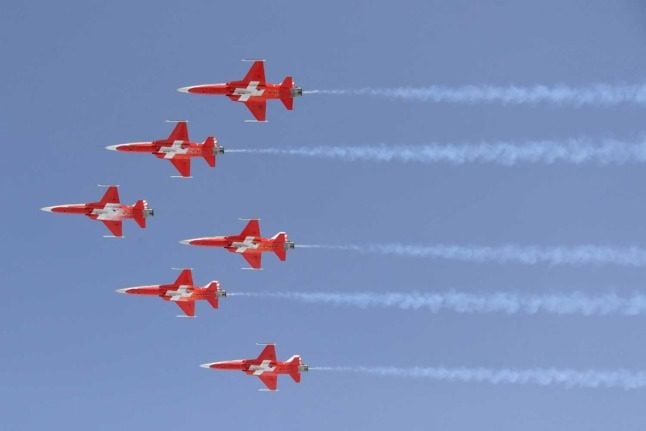In front of a crowd of 8,000 fervent supporters in Tarragona, Catalan president Carles Puigdemont and other separatist leaders announced the official start of the campaign for a vote banned by Madrid on Thursday evening.
 Catalan regional president Carles Puigdemont (R) shakes hands with Catalan regional vice-President and chief of Economy and Finance, Oriol Junqueras. Photo: AFP
Catalan regional president Carles Puigdemont (R) shakes hands with Catalan regional vice-President and chief of Economy and Finance, Oriol Junqueras. Photo: AFP
“Tell all those who doubt, that on October 1st they will face a very simple decision: don't opt for those who want to keep us in the dark, go out on the streets, take a ballot of which there will many,” Puigdemont said on stage in a former bullring.
“Vote, and in so doing bring light to darkness that has lasted for too many years,” he told the crowd that shouted “Independence,” “We will vote” and “We're not afraid.”
Organisers broadcast a campaign video that depicted the brilliant future of an independent Catalonia, free from “injustice”, “threats” and embracing “freedom”.
Tarragona won't participate
The event topped weeks of mounting tensions in Spain as Catalan leaders prepare a referendum on October 1st despite Madrid's ban and a court ruling that deems it illegal.
On Friday, Rajoy was due to meet members of his conservative Popular Party in Barcelona and was not expected to address any crowds.
The pro-independence camp has two weeks to win over critics who are reluctant to take part in the referendum.
In July, a poll commissioned by the regional government found that 49.4 percent of Catalans were against independence while 41.1 supported it. More than 70 percent, though, wanted a referendum to settle the matter.
Outside the ring in Tarragona on Thursday — a city where pro-separatists are in the minority — a few critics mingled with hundreds of independence supporters who were unable to get in.
READ MORE:
- Spain prosecutors threaten to arrest pro-referendum mayors in Catalonia
- 'Catalan independence: 'Politicians are acting like children with a box of matches'
- Police ordered to seize ballot boxes ahead of Catalonia referendum
 Photo: AFP
Photo: AFP
“This isn't a government for all Catalans,” complained Josep Enric Sabate, a 44-year-old real estate entrepreneur.
“This isn't for real, only supporters of independence will go vote, they will win and who knows what will happen after.”
If they win, the separatists vow to declare independence within days for the wealthy northeastern region of Spain, with its capital Barcelona, home to around 7.5 million people.
Parties that oppose secession will not take part in the campaign for the vote and have asked their supporters to boycott it.
Carles Ruiz, the Socialist mayor of Viladecans, a town of 65,000 residents, denounced “pressure” on those mayors who refuse to participate in the referendum on social media or in person.
“Some post photos of the mayors or of their homes,” he told AFP.
'Threats make us stronger'
Catalonia, which accounts for about one-fifth of Spain's economic output, already has significant powers over matters such as education and healthcare.
But Spain's economic worries, coupled with a perception that the region pays more in taxes than it receives in investments and transfers from Madrid, have helped push the cause of secession from the fringes of Catalan politics to centre stage.
Catalans have nurtured a separate identity for centuries, but an independence movement surged recently as many became disillusioned with limitations on the autonomy they gained since the late 1970s after the Francisco Franco dictatorship, which had suppressed Catalan nationalism.
 Photo: AFP
Photo: AFP
The pro-separatist camp argues that a referendum represents their right to self-determination and has criticised what they see as heavy-handed measures by Madrid to stop the vote.
“The attitude of the state is so aggressive that no democrat can remain indifferent,” Ramon Pique, the coordinator of the campaign of the Catalan National Assembly, an influential pro-independence citizens group, told AFP.
Spain's public prosecutor has ordered a criminal probe of the over 700 Catalan mayors who have so far agreed to help stage the referendum and threatened to arrest them if they do not turn up for questioning in court.
Prosecutors have also ordered police to seize ballot boxes, election flyers and any other item that could be used in the referendum and launched an official complaint against Puigdemont and other top Catalan officials over their referendum plans.
But this only appears to strengthen the resolve of pro-independence Catalans.
Oriol Junqueras, Catalonia's vice-president, told Thursday's gathering that more than 47,000 volunteers were willing to help out with the vote.
“Threats make us stronger,” he said.
But a question mark remains over Barcelona, Catalonia's biggest city run by Mayor Ada Colau, a left-wing former activist.
On Thursday, she tweeted that people would be allowed to vote “without putting institutions or public workers at risk,” without detailing how this would actually happen.
By Daniel Bosque and Laurence Boutreux / AFP



 Please whitelist us to continue reading.
Please whitelist us to continue reading.